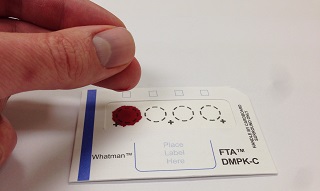Thuis bloedprikken na een orgaantransplantatie

Patiënten met een getransplanteerd orgaan hoeven binnenkort minder vaak naar het ziekenhuis voor controle, omdat zij dan zelf thuis bloedmonsters kunnen prikken en ter analyse opsturen. Dat concludeert Remco Koster, onderzoeker-analist in het UMCG, in zijn proefschrift waarop hij 25 september 2015 promoveert aan de Rijksuniversiteit Groningen. ‘Door mijn onderzoek kennen we de beperkingen van verschillende analysemethoden,’ legt hij uit. ’Maar de Dried Blood Spot (DBS)-methode blijkt zeer geschikt om patiënten thuis te monitoren.’
Patiënten die een orgaantransplantatie hebben ondergaan, slikken de rest van hun leven medicijnen die het afweersysteem onderdrukken. De medicijnen voorkomen afstoting van het nieuwe orgaan. ‘De dosis van zo’n medicijn komt heel precies’, vertelt Koster. ‘Teveel of te weinig in het bloed kan gevaarlijk zijn. Daarom moeten patiënten nu regelmatig naar het ziekenhuis om de hoeveelheid medicijn in het bloed te meten.’

Bloed op een kaartje
Dat probleem kan dus opgelost worden met de Dried Blood Spot (DBS) methode. ‘Patiënten prikken thuis in hun vinger en laten een druppel bloed op een speciaal daarvoor bestemd kaartje vallen. Dit kaartje laten ze even drogen en sturen het dan op naar het ziekenhuis. Op het laboratorium wordt het monster geanalyseerd, waarna de apotheker en arts kunnen beoordelen of de dosering aangepast moet worden.’ Het scheelt patiënten tijd, reiskosten en gedoe.
Beperkingen
De DBS-methode is niet nieuw. ‘Er was voor zover wij weten nooit goed onderzoek gedaan naar de beperkingen van de methode.’ Dat deed Koster wel. ‘Elke analysemethode, of je nu meet in bloed, in zweet of in haren, heeft zijn beperkingen en voordelen. Die heb ik tijdens mijn promotieonderzoek in kaart gebracht. Als je weet welke beperkingen een methode heeft en welke factoren de resultaten beïnvloeden, kun je de kwaliteit van de analyses verbeteren.’ Ook van de DBS-methode onderzocht Koster verschillende factoren, zoals het materiaal van het kaartje, de invloed van de dikte van het bloed en het soort medicijn in het bloed. ‘Doordat we de beperkingen van de DBS-methode nu kennen, kunnen we haar gaan toepassen.’
Start in 2016
Die toepassing begint al in 2016. Dan zullen de eerste patiënten die Tacrolimus slikken, een veelgebruikt medicijn na orgaantransplantatie, thuis hun bloedmonsters kunnen afnemen. De instructiefilmpjes en -teksten zijn er al. ‘We beginnen met dubbelmetingen, om die van de DBS te vergelijken met de metingen die we normaal gesproken uitvoeren in bloedbuizen.’ Toch moeten patiënten nog wel naar het ziekenhuis. ‘Patiënten die een transplantatie hebben gehad, moeten ook op andere zaken gecontroleerd worden, maar dat hoeft minder vaak.’ In de loop van 2016 wil Koster ook transplantatiepatiënten die andere medicijnen slikken, thuis zelf bloed laten prikken.
Tuberculose
Ook bij andere type patiënten kan DBS een grote rol gaan spelen. ‘In landen waar veel tuberculose voorkomt, zoals bijvoorbeeld Vietnam of Oost-Europa, worden patiënten nu nauwelijks in de gaten gehouden. Met DBS kunnen artsen op afstand zorgen dat patiënten de juiste dosis medicijnen krijgen.’ Ook onderzoekers gebruiken de methode al. ‘Als een onderzoeker samenwerkt met andere landen, kunnen daar bloedmonsters genomen worden die we hier kunnen analyseren.’
Curriculum vitae
Remco Koster promoveert aan de Rijksuniversiteit Groningen op het proefschrift The influence of the sample matrix on LC-MS/MS method development and analytical performance . Koster studeerde Analytische Chemie aan de Saxion Hogeschool in Enschede. Hij is sinds 2005 werkzaam als Research Analist in het Klinisch Farmaceutisch en Toxicologisch Laboratorium bij de afdeling Klinische Farmacie en Farmacologie van het UMCG (Universitair Medisch Centrum Groningen). Hiernaast voerde hij vanaf 2012 zijn promotieonderzoek uit bij de Rijksuniversiteit Groningen, bij het onderzoeksinstituut GUIDE binnen het onderzoeksprogramma Biopharmaceuticals: Discovery, Design and Delivery. Zijn promotoren zijn prof.dr. D.R.A. Uges en prof.dr. J.W.G. Kosterink, co-promotor is dr. J.W.C. Alffenaar.
Meer nieuws
-
19 december 2025
Mariano Méndez ontvangt Argentijnse RAÍCES-prijs
-
18 december 2025
Waarom innoveren, en voor wie?
-
17 december 2025
Ben Feringa wint Feynmanprijs
